- Home
- Adam Thorpe
Hodd Page 26
Hodd Read online
Page 26
He fled abroad, and there fell in with certain men and women in northern Francia, who were of the same mind, that to sin is impossible, for God (though they gave Him not that name, being blasphemers, but sundry others) is in all things – and how can He Himself sin? There they roamed (as they do now, alas!), gaining many followers in their absolute denial of Hell: and indulging in drunkenness, whoring and the sins of Sodom, they thieved and blasphemed until some were seized and burned, and others hanged, and yet others recanted after torture.374
Hode escaped all this by his usual cunning, fleeing upon a stolen horse. ‘I was saved then,’ he said, ‘not by what others call God’s mercy, but by a damsel of such gentle beauty and simple honesty that I did believe her to be an angel. I happened upon her fetching water at a well in a village near Boloigne,375 and then and there, as we were talking, I vowed that all I had thought and experienced should be cast upon the dung-heap, and I was born afresh. For truly I have never loved a creature before or since, as I loved this maid. And being no more than a cowman’s daughter of sixteen years, she was glad to be courted by a man of refinement, for despite my vices and crimes (as they are termed), I had kept my graceful appearance and scholarly ways.
‘She bore a simple devoutness, as many such do, and I made no headway with my heretical thoughts, wooing her instead with flattery. Yet I loved her so, that this was not falsity, but truth, and of my true beliefs I said not a word. I laboured well upon the farm, so that the time came when we should be married. I was happy as a lark, agreeing to be married in the church, with a mass, for the whole family was devout – and so impressed was I by her goodness, that I e’en began to think once more that there was a God in Heaven, and such a thing as love, and that I should please Him, for He seemed willing to deliver fruits to the greatest sinners, that they should be saved.
‘Alas, if sins exist (which they do not), that decision [to be married in church] was a most heinous one, and I was punished for it. Within a year she was dead, of a most horrible carbuncle in the brain, and God to me was either a savage and ungrateful torturer of the human race, or He did not exist.’
Here Hod began to weep silently, which was vexing to me – for I knew him as one who never spilt a single tear. So I asked, in a most hard-hearted manner: ‘Pray, did this cowman’s daughter have bluish-grey eyes, master?’ And he looked up and nodded, and such a meekness did I see in his face, that tears came to my own eyes.
After this most grievous loss – for which he did squarely blame his weakness, in being thus married in church with a full mass – he returned to England as a half-crazed penny-preacher, wishing to spread the heresy through the countryside: a most dangerous pursuit. But he soon fell into outlawry, murther and robbery. In truth, I felt less certain of him then, because it seemed to me he had become what he was through love’s sickness, and not through a message of truth from the othair.
Thus did he recount his earlier years, saying I must turn it to song; and I confess that I felt encompassed in the warmth of his false flattery, being further intoxicated by the sorcerer’s soup [of mushrooms], that once more turned the white birch bark upon the walls to mysterious hues and forms.
All this I recalled on my fleeing the camp, and vowed never to sing of him – but you, patient reader, shall see what became of that vow!
The only routes I knew were two in number: one which led to the road by many a circuitous turn, and the other to the glassworks by way of the hill of bracken, from which I had first espied the outlaws’ wood. Thinking how I might be pursued by the felons on the first, and they swifter than me on their mounts, I made for the bracken hill, stumbling oft into holes and ditches, or torn by gorse and brambles under a thick-starred sky. Soon, as the easterly welkin paled to dawn, I arrived upon the hill very weary, and there I slept upon the green fern – for though Riched had cut most of the brown leaves for the ovens, new growth had flourished the more, and it was very like a shallow sea, reaching over my knees when I entered there.
I had a great wish to find a familiar face from my former life, but could not ever return to St Edmund’s, and prayed fervently that Ricchet would be present at the works: howsoever brief had been our acquaintance, I had clothed him in the raiments of a gallant elder brother, and such brotherly … [sentence unfinished ].
I awoke, and seeing it was well after dawn and very fine, with a lark trilling so high above in the sky, that it must nigh have been touching the waters of the upper sea, I climbed cautiously to the very crest of the field of bracken: from whence I could descry, on the rolling horizon, the pale blue hill, more than a league distant, capped by the outlaws’ thick-boughed lair, from which smoke rose: and though ’twas the very contrary to the hill of Moses, yet I felt an inward dread!376
It being a clear day, methought suddenly I espied a flashing from the wood, that chilled my joy and made me crouch deeper in the fern. Though I had learned the secret of that glass-flashing (for it was indeed simple, like a huckster’s code at dicing, or as prisoners tap through walls),377 I knew not whither it was sent, nor from what secret places it was answered: never had I considered that one of those places was this very field!
I felt horror pinch me all over, for it was flashing S E K378 many times; which meaning ‘to seek’, was always flashed upon the half-hour on suitable days, that the signaller without might know there was a message. Yet there was no one else on that hill, lest they be crouched in the shallow fern.
Mayhap the felons knew I was here, and sought to terrify me – Hode watching where I hid, in a way that lay beyond all human sense! ‘Ey,’ I moaned to myself, ‘what if that lark has been rapt by him into being his eye, or he hath become the lark itself in high contemplation?’ – as Hodde was indeed (to the credulous part of my youthfulness) the vast soul of all things, absorbed into the divine essence of Creation; that to believers is named the Godhead?
Again I expected a barbed point to pain me at any moment, as I waded through the bright-green ferns, in the direction of the glassworks. Yet there was no movement around me but the searching bees, butterflies, mice, and other creatures of the Lord’s Creation that in summer, as we know, doth laugh in the merry sunshine.
Rare are those places without the common people, so crowded is Yngelond,379 yet lonely were those low hills to me, and most barren of fruit or corn. Of all the four-footed creatures therein, I saw only a roe deer fawn at the edge of a thicket, quite immobile, and some fleeing rabbits and a hare bounding before me. Reaching the sunken track we had taken from the works but a year before, and being now a mile from that fiery place, I was overjoyed to see a human figure advance upon me; and e’en more joyful was I to see that it was Richerd!
In my unhappy year as an outlaw and felon, I had seen him always as that angelic vision upon the ladder, his face effulgent in the sunlight from the unglassed lancets, far above the heaviness and stink of the fallen world. Yet he himself seemed discomfited to see me, though I embraced him as a lost brother. Much out of breath from hurrying, he had to be thrice reassured that I was not returned from the dead, but escaped from the heretic outlaw, Robert Hodd, and was indeed making for the glassworks.
‘Hast thou escaped from those wolfheads,’ he cried, ‘and fearest not they will pursue thee?’ ‘Nay,’ I answered, ‘yet a little fear did I feel just now, for I saw them signalling after their fashion, with glass and sunlight, as others use fire or trumpets.’
At this, Richet looked past me, from whence I had come, as though the flashing was there upon the track; and as my eyes dwelt upon him, I wondered why he seemed so disturbed, moving his mouth as though chewing food. Mayhap it was because I had grown sudden taller, as boys do at fifteen or sixteen, and had sprouted soft hairs upon my upper lip, my voice discordant and uncertain. ‘I pray thee,’ he said, gripping my shoulders of a sudden, ‘go not to the glassworks, but further on, further on; and talk to no one until you are ten leagues distant! Tarry not at Pont[e]fract, for Hode has many an informer there, nor even in Yorke, but after that y
ou may be safe.’
I nodded, much amazed at his knowledge, and said I knew that in Yorke (and other cities and towns) there were merchants and traders doing business with Hode, to their own profit, and important officials who were in league with him – for several of the outlaws were from the noblest families, guilty of crimes none could hide or forgive them for, and thus they had fled to the woods.
And then he clapped me upon the shoulders and laughed: ‘Weylaway, did he make a true felon of thee?’ I told him that I had sinned in the most horrible ways, and felt tears starting in my eyes – and a shuddering gripped me.
Then Richet said: ‘There is naught in the world that is sinning, but for one thing: to call any action sinful.’ And I saw only gravity and no jesting upon his handsome face.
As a cliff might crash into the sea under the waves’ repeated blows, I then understood what he was: I gaped, but my tongue clove to my mouth, and I might have swooned but that Ricchet held my arms.
‘Nay, little brother,’ he said, ‘do not forgive me, for as there is no evil but the false name of the priests’ God, like a chain about our spirits, so there is no need for forgiveness. What I did, in sending you into the lion’s den, was a righteous act, because I felt it in my heart, and our hearts are made by the divine essence. Our master wished to have a brother in the glassworks, for the trees must not be cut [for glass], that greenwood being his temple.’ Then reaching into his pouch, he pulled out a portion of glass, smoothed at the edges and very clear, and of fantastic lustre in the sunlight. ‘I will tell them you are nowhere northward, but how report doth tell of a nut-brown swain, with a harp upon his back, on the southward road to Nottynggam. This also I feel in my heart, and thus it is good.’
He embraced me then, and I relented, though I was angry indeed within, and bewildered. For no doubt on that very day we had cut bracken, he had signalled to them from the crest that I was coming that night; and thus I was so swiftly and mysteriously spotted and taken. ‘I will call thee Trich Richerd,’380 I said, ‘for you are the best of dissemblers.’ In my heart, however, was more sorrow than I could express, for mayhap without his encouragement I would not have sought my harp, but stayed on in the holy house – and remained undefiled by heresy.
We parted swiftly, and I knew we would never meet again. Then the whole world did seem as issuing from Hod’s bowels – every person in it, and every tree, and every grass-blade and every creature, down to the littlest [de minimis], for he seemed the author of all. Yet I hurried forth into it, passing the glassworks at a distance yet close enough to smell the smoke of that foul and burning oven, that yields such perfection of coloured light.
Entering upon a deep road going north, I skirted Berny[s]dale and Pon[te]fract by a westerly ford [of the river], for it was the dry month – though the false hermit there demanded alms for the favour of praying for my safe passage across, when he was but a sluggard and shirker with a long beard. For I was seeking a true hermit, whom I last left six or more years earlier, in the foullest and most treacherous manner possible, betraying his infinite trust and love.
Dear reader, who hath been faithful to my words for so long, that no doubt your eyes ache by the light of a candle or the glare of a window, as my hand and every feeble part doth (for so taxing be this writing business, when it be in your own hand, as none can believe who have never studied) – do not inflict bodily harm upon this manuscript, in disgust with the author. For I am not now as I was then, flitting from branch to branch, ever uncertain; or as that wild and vagabond musician, the grasshopper, that doth always leap and fritter, and sings from morn till night. I have remained within this holy house for near eighty years, scarce leaving it for a single night; for by the door that, with Adam, we were cast out of, so by the second Adam381 we might enter into Paradise, that we once knew and have ever a distant remembrance of – though this Eden be e’en sweeter than the earthly garden, for it hath the name of Heaven enscrolled above its narrow wicket gate.
Thus I fled northwards, while unknown to me the archangels towered above as over an ant, ready on an instant to crush me with their thumbs, for I was too small for their burning swords. Although I deserved no more, God the Ever-Merciful stayed their hand, and Christ and His Sacred Mother, the Steadfast Virgin, were privy to His conspiracy, for they in Heaven’s clearness and brightness of light, made dazzling by the high walls of crystal that surround that sacred realm, smiled down upon me in pity rather than ire.
The common folk (as much as the nobler), much loving of music and e’en making it with their own disaccording voices in taverns and so forth,382 bid me sing and play at each stage whereat I paused from pressing forward upon the way, thinking me only a minstrel of youthful years. Earning my food and humble shelter by this means, how could I refuse? For otherwise I had not a penny on me, and this music was my spending-silver.
Alas, the English delighting not only in song but in drink, and oft draining full goblets, whether of wine or ale, in a single draught – and bidding you do likewise in those unrulier times, I witnessed scenes of great debauchery in tavern and inn and also in great halls. Thus is the life of a minstrel speedful to sin, and all manner of pollutions, however pure and honourable his singing matter; and may open the door to the enemy of mankind as much as doth the buffoonery of a play.
Yet here is the strangest thing, that was like an enchantment: whene’er my fingers began to pluck the fox-gut of that fine harp, its fox’s wiles entered by the tips, and travelling through my arteries to the ventricles and chambers of my brain, then down again to my mouth, it made me sing of the betrayal and capture of Robert Hodde, and his release from that foul dungeon through our pluck and wiles; so that each time I was forced to make my confession openly – though no one knew it who gaped upon me, listening to my chant.
And the shower of pennies cast at my feet, and the roaring and clapping of tables and benches after, did show the power of God’s ways: for although I thought then it was the Devil’s spell, so cruelly strangling my infant salvation, it was in truth the Lord’s way of merciful punishment, that I should confess (and not deny or secrete) my great and mortal sin. For was it not Henrie’s harp I played, and his own wretched spirit that each time hovered over me – weeping with its ghostly fingers in prayer-weft, dropping hot blood from its hideously gaping neck upon my hands (a thing that only I could see) when I sang the verse of his slaying: thereby scorching upon them greasy marks that turned in years to come to these dark blots [maculas] upon the withered back of each hand lying before me now?
Again and again they bid me sing the rhyme, never tiring of its tale – and not suspecting that Moche the minstrel was there before them in the flesh, murtherer and thief that he was. When I turned to other songs, such as Ey! ey! What the night is long! And ich, with well mochel wrong, sorwe and mone and caste,383 and so forth, they did laugh to see me so distressed, my eyes red with tears – as though I uttered what was true. And so wearied was I by this playing, that I would oft swoon after: which instead of making them desist, enticed them to urge me, with water upon my face, to recover and play more songs – e’en the very same!
So my progress to the coast was hampered, and weeks fled by; for by this means I earned, not only bread and sustenance, but sufficient pennies to turn into shillings and ensure my keep for further weeks or months, such is the attraction of lucre. And in this, I was but as most men are; for things have grown worse since: who careth for aught now but to fill his bags, and heap up false treasures, e’en as the innocent die of hunger and poor folk go a-begging? Yet always (though I had already reached many leagues north) was I fearful of seeing one of the outlaws among the folk in the taverns or markets where I played. And e’en when a minx, daughter of an alehouse-keeper – and of exceeding comeliness – stroked my face with her long fingers and lasciviously confessed to loving me, I grew afraid, thinking it a trap to lure me to my doom, and wrestled free.
Imagine my horror, then, when but five weeks or so after I fled the wood, travel
ling north of Yorke and scarce two easy days from the hermit’s cave, I passed an inn at the dinner-hour, with a long table set before it for the cooler air, crowded with traders and so forth (chattering like jackdaws about a great fleshpot), and heard of a sudden my own rhyme being declaimed in a mangled fashion, to the horrible accompaniment of a fiddle betwixt the verses, and foolish gestures – turning even that table quiet!
Seeing servants fetching more meats from the kitchen, I enquired after them of the hired minstrel, and they said, ‘What? Wouldst thou play instead of master Alan de Auleige?’ And even these rascals seemed to suffer from incontinence, for they laughed in a ghastful manner. Never having heard of master Alan de Aulleige, I feigned indifference, and would have waited nearby until the end of the meal; but the fat and irascible inn-keeper coming out of the door, kicked me off as a vagabond, calling me a dog waiting for scraps – to which I vociferated that master Alan de Auleige had stolen my song, and I would have redress.
Then master Allan de Auleig hearing this amazing insult, and on the instant recognising me, generously bid the inn-keeper to leave off breaking my ribs; thereupon telling the assembled that I was a minstrel sent from Heaven, and that it was from none other than this green-looking youth that he had learned the ballad of the outlaw Robbert Hod! He was dressed in a threadbare parti-coloured coat with a red belt buckled by lustrous brass, and had long grey hair about a dignified face, marred only in the middle by a nose somewhat red-veined and pocked: his graceful appearance went ill with the manner of his playing. The people demanding I play myself, I did so, and so great was the delight after the aghast silence, that I was carried about on their shoulders, and must sing it ten more times, with Alan de Auleigge playing alongside, until e’en my hardened finger-tips bled.

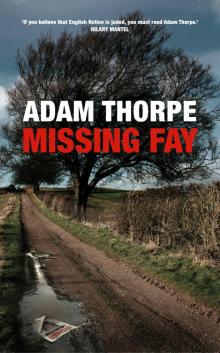 Missing Fay
Missing Fay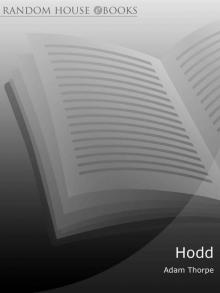 Hodd
Hodd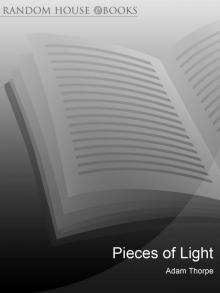 Pieces of Light
Pieces of Light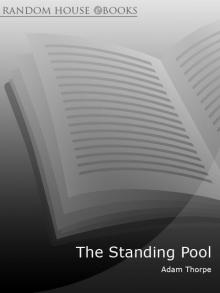 The Standing Pool
The Standing Pool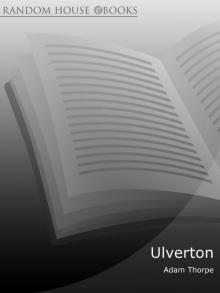 Ulverton
Ulverton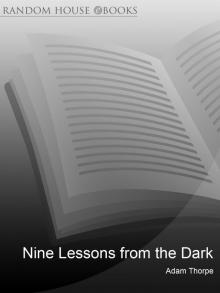 Nine Lessons From the Dark
Nine Lessons From the Dark Flight
Flight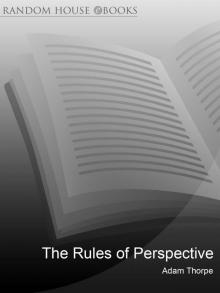 The Rules of Perspective
The Rules of Perspective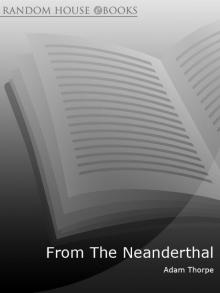 From the Neanderthal
From the Neanderthal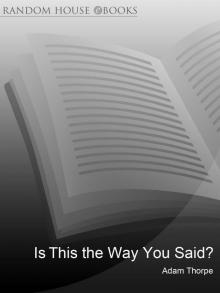 Is This the Way You Said?
Is This the Way You Said?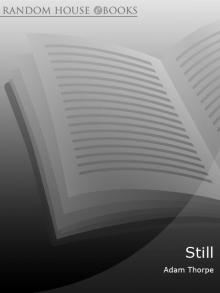 Still
Still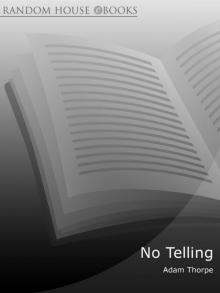 No Telling
No Telling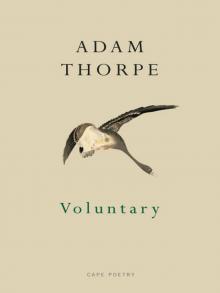 Voluntary
Voluntary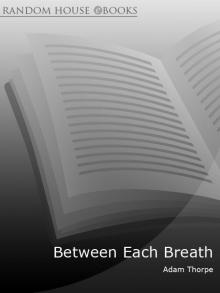 Between Each Breath
Between Each Breath